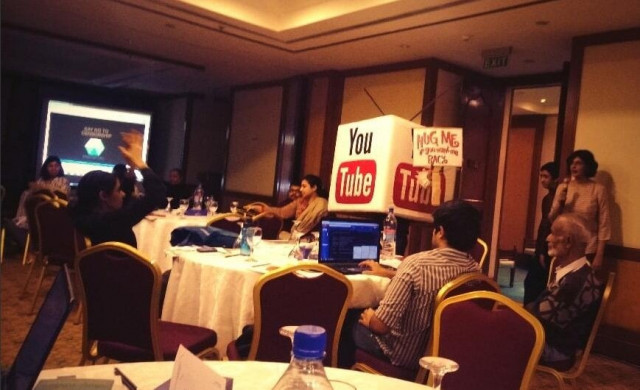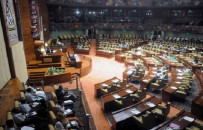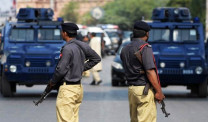Cat-and-mouse game of internet censorship continues in Pakistan
Government policies on censorship are arbitrary, futile: panelists on Pakistan's internet landscape.

These are just a few of the questions Jahanzaib Haque, Web Editor at The Express Tribune, raised while presenting his report on ‘Pakistan’s Internet Landscape’ at the Avari Tower hotel on Friday.
The 28-page report, produced for human rights organisation Bytes for Pakistan, Pakistan (B4A), provides a comprehensive look at internet usage and policies in the country.
During his presentation, Haque briefly discussed some key findings from his study. Some of the primary concerns he pointed out were the inconsistency and lack of transparency in government policies.
“When the government bans pornographic sites, it says they are removing obscene material from the internet. But who defines what is ‘obscene’?” asked Haque.
"@Twittistaan: "Blocking and filtering of websites in Pakistan has been systematized in recent years"- @jhaque_ at #InternetPK" #YouTubeBan
— wearedone (@farewellhere) January 10, 2014
He also pointed out how sex education website scarleteen.com and gay rights site queerpk.com - neither of which contain pornographic material - have been banned in Pakistan purportedly for being obscene.
Dissemination of hate speech was another concern raised in Haque’s report and he ended the presentation with screenshots from social media sites of hate material targeting human rights activists and members of religious minorities.
https://twitter.com/SaraMuzzammil/status/421589445113315328
To counter hatepeech, there's a need for counter narratives steeped in love, says @sabeen at #InternetPk.
— Furhan Hussain (@FurhanHussain) January 10, 2014
His presentation was followed by a panel discussion in which he was joined by B4A's country director Shahzad Ahmad, PeaceNiche's Sabeen Mahmud, technologist Aleem Bawany and BBC Urdu's Wusatullah Khan. The panel discussion was moderated by journalist Gul Bukhari.
While Ahmad stressed on the importance of challenging laws that justify surveillance on citizens or those that silence political dissidents, others focused on who should be the one to decide what is blocked for access, or who should be monitored by the government and how existing mechanisms had failed to stop the public.
“You cannot stop the rain," said Bawany, who runs a technology company and works with Dawn. "How many holes can you possibly plug?"
He highlighted the futility of blocking websites when people continue to circumvent them through virtual private networks (VPN) or proxies and even escape some government snooping by using TOR networks. He encouraged internet users to use the secure hyper text protocols such as "https" to protect themselves from snooping.
'internet in Pakistan seems to be governed by blasphemy laws' #internetpk
— Sundus Rasheed (@SundusRasheed) January 10, 2014
BBC’s Wusatullah pointed out that censorship is not new in the Pakistani sphere and compared the present-day censorship of websites to that of print journalism during the Ayub Khan and Ziaul Haq regimes.
“It’s just a cat-and-mouse game,” he said. “We are stuck between truth and hypocrisy, and the internet is simply a reflection of that.”
A huge chunk of ICT R&D fund in Pakistan is being diverted to edu institutions to buy & customise surveillance tech. #InternetPK
— Uzi (@GeoffBoyardee) January 10, 2014
This echoed a point made earlier by Sabeen Mahmud, who said that technology is simply a vehicle for people.
People blame Facebook and Twitter, but hatred is inherently within people, she stated.
She also screened a short video that had been released on social media earlier in November 2013.
Produced by ‘Pakistan for All,’ a citizens collective, the video features a YouTube mascot making the rounds of the city while holding a sign that reads ‘Hug me if you want me back.’
Midway during the screening, the YouTube mascot made an appearance at the conference and was met with a round of applause and a hug.
If you want #Youtube then Hug Him.... #internetpk #Karachi #Pakistan pic.twitter.com/ZebNo6C4xV
— Colors of Karachi (@steelkekeel) January 10, 2014
The audience featured some faces who are more recognisable for their online activism, especially on twitter like Muttahida Qaumi Movement’s MNA Syed Ali Raza Abidi and Pakistan Tehreek-e-Insaf’s Dr Awab Alvi.
Pakistan Internet Landscape Launching of Research Study and Discourse #internetpk @abidifactor @faizanlakhani pic.twitter.com/tQ1KpHIV7N
— Colors of Karachi (@steelkekeel) January 10, 2014
Spats between the two parties can frequently be found on Twitter but the two graciously shook hands with each other at the event when Bukhari announced their presence to the rest of the audience.
When Haque asked the two if they are concerned about being under surveillance since they are political figures, Alvi stated that he has become extremely careful of the language that he uses online so as to avoid instigating arguments and controversy.
“Phone tapping happens and will continue to happen,” said Abidi, who is part of the National Assembly Standing Committee on Information Technology.
Abidi also pointed out how militant groups such as Tehreek-e-Taliban Pakistan (TTP) continue to freely post statements online despite blocks and bans.
“Either we don’t know how to trace where these statements were posted from, or we just don’t want to find out,” he added.
MQM MNA @abidifactor says only one meeting of NA's standing committee on IT is held so far, in which "damad" was named chairman. #InternetPK
— Faizan Lakhani (@faizanlakhani) January 10, 2014
Abidi, who is a member of the National Assembly, also added that he is in the Standing Committee on Information Technology and Telecommunications but they have only held one meeting thus far.
Yes I want YouTube back! #internetPK pic.twitter.com/DIkXzgRtDY
— Syed Ali Raza Abidi (@abidifactor) January 10, 2014
#InternetPK @abidifactor rightly said until IT PAC gets its act together nothin will change, only session to swear in Capt Safdar #DamadeAla
— Awab Alvi (@DrAwab) January 10, 2014



















COMMENTS
Comments are moderated and generally will be posted if they are on-topic and not abusive.
For more information, please see our Comments FAQ